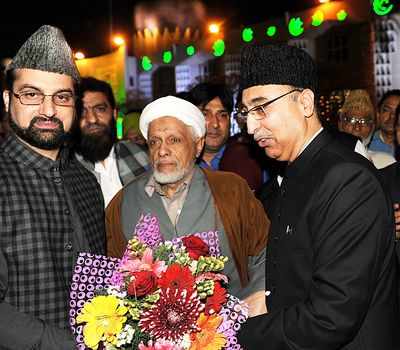- News
- India News
- Government says it’s okay with Hurriyat talking to Pakistan
Trending
This story is from May 2, 2016
Government says it’s okay with Hurriyat talking to Pakistan
The change of stance comes two years after imposing a policy whereby Pakistani officials meeting Hurriyat leaders was a distinct "no-no". However, in a written answer to the Parliament, VK Singh ha also clarified that there could be no role for any third party in the India-Pakistan dialogue process.

NEW DELHI: India has quietly dumped its most controversial “red line” with Pakistan. Two years after imposing a policy whereby Pakistani officials meeting Hurriyat leaders was a distinct “no-no”, India has officially walked back from this position, as it has become increasingly untenable.
In a written answer to Parliament last week, minister of state for external affairs VK Singh had stated, “Since the entire state of Jammu and Kashmir is an integral part of the Union of India and these so-called Kashmiri ‘leaders’ are Indian citizens, there is no bar on their meetings with representatives of any country in India.”
He, however, clarified that there could be no role for any third party in the India-Pakistan dialogue process.“India has consistently maintained that there is no role for a third party in the bilateral dialogue between India and Pakistan as per the Simla Agreement and the Lahore Declaration. India’s displeasure at Pakistan’s attempts to interfere in India’s internal affairs has been repeatedly conveyed to Pakistan,” he added.
In August 2014, the Modi government imposed a new pre-condition to talks with Pakistan, cancelling foreign secretary talks on the argument that the Pakistani high commissioner had met Hurriyat leaders before the official talks. That added a new, belligerent dimension to the bilateral dynamic.
In the process, the Modi government was roundly criticised for bringing into the limelight a group like the Hurriyat. The NSA dialogue crash-landed without anybody being a winner.
But a thaw was discernible after the Bangkok meetings between NSAs, which has started a new channel of quiet communication on security and terrorism between Ajit Doval and his Pakistani counterpart Nasir Khan Janjua. Clearly, the government was beginning to see how difficult it would be to impose such a ban without physically locking up Hurriyat leaders and appearing unreasonable.
The Pakistan Day celebrations this year saw a full complement of Hurriyat leaders in attendance, while the high commissioner, Abdul Basit, has even met Asiya Andrabi of Duktaran-e-Millat in April, without attracting criticism from the government.
In a written answer to Parliament last week, minister of state for external affairs VK Singh had stated, “Since the entire state of Jammu and Kashmir is an integral part of the Union of India and these so-called Kashmiri ‘leaders’ are Indian citizens, there is no bar on their meetings with representatives of any country in India.”
He, however, clarified that there could be no role for any third party in the India-Pakistan dialogue process.“India has consistently maintained that there is no role for a third party in the bilateral dialogue between India and Pakistan as per the Simla Agreement and the Lahore Declaration. India’s displeasure at Pakistan’s attempts to interfere in India’s internal affairs has been repeatedly conveyed to Pakistan,” he added.
In August 2014, the Modi government imposed a new pre-condition to talks with Pakistan, cancelling foreign secretary talks on the argument that the Pakistani high commissioner had met Hurriyat leaders before the official talks. That added a new, belligerent dimension to the bilateral dynamic.
Since the Agra summit in 2001, Pakistani leaders and senior officials have been meeting Hurriyat leaders regularly without the government throwing a fit. Nobody liked it in the government, but they left it at that. In August 2015, when India and Pakistan were battling about the terms of reference for a meeting between NSAs after the Ufa understanding, it was once again the threat of a meeting with the Hurriyat that derailed the talks at the last minute. Trying to defend a silly position, the government went to the extent of locking up Hurriyat leaders to stop them from coming to Delhi.
In the process, the Modi government was roundly criticised for bringing into the limelight a group like the Hurriyat. The NSA dialogue crash-landed without anybody being a winner.
But a thaw was discernible after the Bangkok meetings between NSAs, which has started a new channel of quiet communication on security and terrorism between Ajit Doval and his Pakistani counterpart Nasir Khan Janjua. Clearly, the government was beginning to see how difficult it would be to impose such a ban without physically locking up Hurriyat leaders and appearing unreasonable.
The Pakistan Day celebrations this year saw a full complement of Hurriyat leaders in attendance, while the high commissioner, Abdul Basit, has even met Asiya Andrabi of Duktaran-e-Millat in April, without attracting criticism from the government.
End of Article
FOLLOW US ON SOCIAL MEDIA










